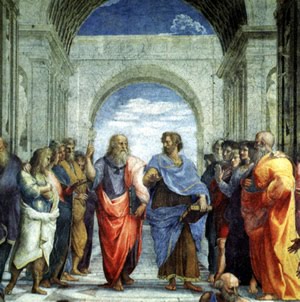The World Is My School

Back to the Academy!
In an article by Maria H. Andersen ("The World Is My School: Welcome to the Era of Personalized Learning") she argues that future learning will become both more social and more personal.
I agree with her that learning WAS social to begin with and has always maintained a social aspect. Social is one reason that students come to school.
Humans have always been learning, but how we learn has changed over time. The earliest means of education were highly personal: Oral histories passed from adults to children, informal or formal apprenticeships, and one-on-one tutoring have all been used in the early history of most cultures. It’s only been in the last two centuries that we’ve used formalized systems of mass public education (aka industrialized education).So, what is changing currently?
Certainly, personalized learning is the more effective method. In 1984, educational researcher Benjamin Bloom found that average students who were tutored one-on-one outperformed 98% of students who were learning via conventional methods (this is referred to as Bloom’s two-sigma problem). However, personal learning is not cost-effective, and so we currently educate students in batches of 20, 30, or even 200 students at a time. This is likely to get worse before it gets better, with prominent philanthropists like Bill Gates declaring that “the best lectures in the world” will be online within the next five years. Certainly we can use technology to deliver those lectures to thousands, or even millions, of students at a time, but a lecture does not automatically produce learning any more than attending a class does.
Is this idea of education as personalized learning new? No. The article references Neal Stephenson’s speculative 1995 novel The Diamond Age which contains a kind of interactive book with a "conversational interface" and “pseudo-intelligence.”
Whether Google+, Diigo, Delicious, Kindles, iPads and all the rest will move us towards that new learning is yet to be seen.
It is happening fast and in unpredictable ways.
These innovative social disruptions have happened quickly, but not from within the existing organizational structures. For example, Facebook did not disrupt phone communication by changing the nature of phone calls or phones. Facebook built an entirely new system that eventually circled back around to phones by the way of phone apps. In the same way, the trick to developing a personal learning system is to abandon thinking about how to build it from within the existing educational system and to begin pondering how such a system could be developed outside of education.
Read the rest of Andersen's article at http://www.wfs.org/content/world-is-my-school
Comments
No comments